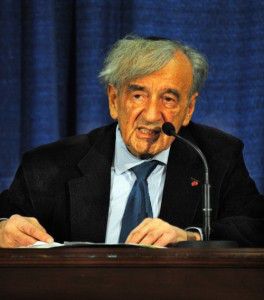
“The Talmud, to me, is an adventure of words,” said Nobel Prize winner and Boston University professor Elie Wiesel on Monday night in the second lecture in his annual three-part series.
Wiesel, who addressed more than 1,000 people in Metcalf Hall, explored the Judaic text in “In the Talmud – The Greatness of Rabbi Eliezer ben Hyrcanus.”
“These stories are the means by which Elie Wiesel can make sense of it all,” said Department of Religion Chair Deeana Klepper, who introduced Wiesel. “The figures in these stories, continue to speak to him, as a way for the past to be understood.”
Klepper said that Wiesel is similar to his subject Rabbi Eliezer in the respect that both value the past and aim to preserve it.
“Elie Wiesel really is the kind, gentle, soulful human being that you imagine him to be,” Klepper said. “By now, he must have spoken to tens of thousands of people in these lectures.”
Wiesel described the story of Rabbi Eliezer, who he said committed himself to studying the Torah and faced punishment for expressing his controversial beliefs.
“Eliezer fought for his ideas,” Wiesel said. “Once he had reached the limits of his patience, you could almost hear him cry out in desperation.”
All legal opinions issued in Eliezer’s name were declared invalid and thrown into the fire, after which Eliezer was excommunicated, Wiesel said.
“I wish I was as courageous as he [Eliezer] was but nevertheless, just like I said last week about Isaac, I also like Eliezer because of his solitude, tragic end. He was who he was, he never tried to surrender, he remained faithful to his ideas, no matter what others said,” Wiesel said. “He was ready to be alone, which isn’t always easy and it wasn’t easy for him.”
While Wiesel highlighted Eliezer’s bravery, he also questioned what his stubbornness reflects about the Talmud. The Talmud, he said, should focus on dialogue and the celebration of different views, which Eliezer’s story contradicts.
“Isn’t the Talmud about the art of listening? The main principle is ‘come and listen.’ Listening means always understanding the views of others,” Wiesel said. “To study Talmud is to study values and principles, to study the art of studying. Studying implies memory and respect for the other, what to say to others, especially those who disagree.”
Wiesel explained that the Torah does not change, but its interpretation does. Likewise, God does not change, but rather exists in every man, in everything that he or she does, he said.
“The Torah is eternal and timeless but that does not mean that it is above time,” Wiesel said.
Audience members said Wiesel’s speech was powerful.
“I’ve heard him speak before but every time, it is even more real to hear from a Holocaust survivor who is so well-known in our society,” said Pauleen Faynberg, a high school sophomore at Gann Academy, a Jewish-day high school in Waltham. “I found this lecture especially meaningful because he spoke about what I studied in school last year so it brought everything to a whole new level.”
Rachel Tesler, a junior in the College of Communication and College of Arts and Sciences, said she considers Wiesel a “real gem” of BU. For that reason, she said, it is important for students to hear him speak.
“It is a unique BU experience and we are so lucky to be able to hear him speak,” Tesler said.
“I was ready for a discussion to have him explain what he meant by God being a possible student of Eliezer because if anything, it seems like God is a student of the other rabbis,” said Molly Zeff, 25, of Cambridge. “This setting was not conducive for a challenge like that, but I hear that in his classes, he really prefers a Socratic method.”
Zeff said that she found Wiesel to be not only a powerful orator, but a gentle and straightforward speaker.
Wiesel is expected to conclude the three-part lecture on Monday, Nov. 21 with a speech on his reflections on good and evil. Following the lecture, Wiesel will join students at the Hillel House to answer questions in a discussion format.
“I think the only thing I need to say is how deeply he believes in students, which is the message of his lecture,” said Rabbi Joseph Polak, director of the Hillel House. “We listen to great teachers for who they are, in addition to what they have to say.”
This is an account occasionally used by the Daily Free Press editors to post archived posts from previous iterations of the site or otherwise for special circumstance publications. See authorship info on the byline at the top of the page.




I enjoyed reading about Eliezer-
I learned to listen & develop an ear
re: intense studies in music. Presently
learning Hebrew-
sacred and very very beautiful.
I wished I
was taught Hebrew as a child.
I look forward to reading the lecture
regarding good and evil on the 21st.
Re: Elie Wiesel’s blueprint question-
there are so many facets.
Presently studying –
Religious Liberty in the United States
began with the founding of Maryland-
my birth state.
“The most sacred of all property:
Religious Liberty and the people of Maryland”
Mary Katherine
* My Maryland essay: Wiesel Think Tank 14
Wiesel has to write an essay about the Blueprint
question- so does David Tracy and Charlie
Thornton.